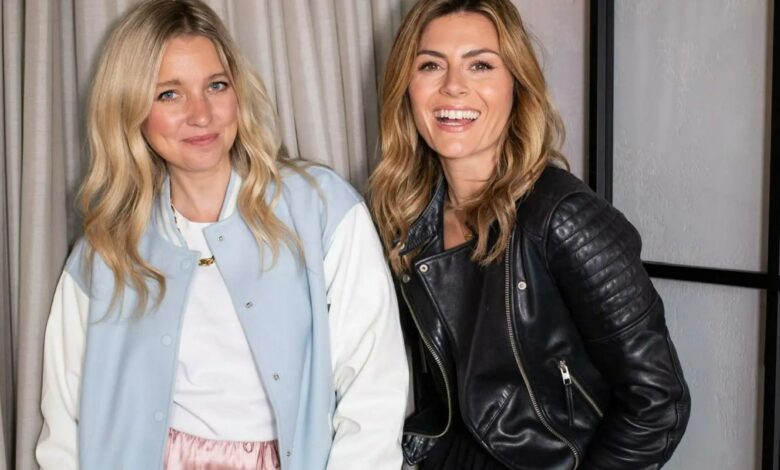I work at Instagram and there’s a reason why you should never put your kids online

Being a parent in the digital age can be tricky to navigate. It can be difficult to know what to post and when.
Luckily, moms and podcasters Zoe and Georgia We sat down with the experts to find out exactly what we should do.
The moms who host the podcast Made by moms spoke to Instagram’s Tara Hopkins and ParentZone’s Vicki Shotbolt to reveal their top tips for keeping kids safe online.
Tara Hopkins is the global director and policy lead for Instagram, while Vicki helps run a charity that keeps children safe online.
But some of the answers the mother received had left them baffled. Georgia said, “The thing is, this is all new to everyone and we’re all just muddling through to figure out what we’re comfortable with.”
Zoe revealed that she asked if they could show children’s faces online and was shocked by the response she received.
The mum revealed she regularly shared her children online and this was the focus of the podcast when she and Georgia first started – but now times have changed.
She added that the response stuck with her and now covered her child’s face on her social media channels.
Now the couple has revealed safety concerns regarding children online and it’s not just what people can see, it’s also what people can create.
AI TECH
Vicki revealed the reason why she was so against children being featured online was all to do with the new technology of AI.
She said: “Every image online now can be created and manipulated by AI to look and appear in a different way than how you originally shared it.”
When thinking about what could be done with children’s photos, Zoë said she “felt sick.”
Vicki added that the problem was that once a photo was posted online, you couldn’t revoke permission to have it removed completely.
While talking about her own photos being uploaded, Vicki recalled a hungover photo she was posted online by a friend and thought “you didn’t ask for it.”
And the same goes for children, she says, who don’t give their parents permission, and can’t do that when they’re so young.
Georgia went to ask about the real dangers of putting children online, and while Vicki calls herself a tech optimist, she said that when things go wrong in the digital world, they really go wrong.
How to keep kids safe online
As we as parents navigate the digital world, UNICEF has provided five top tips to keep your children safe online.
- Have honest conversations with your children about who they communicate with and how, and who can see what they post online. Explain that everything that goes online: photos, videos, comments, things they share with others and what others post and share with them and about them – leaves a trail of information about them. To ensure they leave a positive “digital footprint,” they need to think carefully about what they do and say online.
- Make sure your child’s device is always updated and has the latest software, and that privacy settings are enabled and configured to minimize data collection so people don’t see information you don’t want them to see. Help your child learn to keep personal information private. If your privacy settings are not secure, anyone can see your data. Keep webcams covered when not in use. For younger children, tools like parental controls like safe search can help keep the online experience positive.
- Create opportunities for your child to have safe and positive online interactions with friends, family and you. Connecting with others can be an excellent opportunity for you to model kindness and empathy in virtual interactions. Help your child identify and avoid misinformation and disinformation, age-inappropriate content, and content that may cause anxiety or other harm. Introduce them to reliable sources of information.
- Encourage positive online behavior by practicing it yourself. Be mindful of the example you set and what you share about your child online, including photos and videos. Encourage your child to be kind and supportive of friends and family online by sending positive messages or emojis. If they have online classes, encourage them to be respectful of others and be mindful of what’s on camera to maintain privacy.
- Spending time online can be a great opportunity for your children to be creative, learn, use their voices to share their opinions and support causes that matter to them. Encourage your child to use Internet resources to help him get up and exercise, such as online exercise videos for kids and video games that require physical movement.
She noted that the increase in child abuse images on the internet was “horrifying” and that AI was making the situation worse.
According to data from children’s charity NSPCC, the number of child sexual abuse image crimes recorded by British police rose by 25% last year.
“I would hate to scare anyone, but the risks are now greater than before because of AI,” Vicki revealed.
Tara also agreed with the sentiment, saying it was “an incredibly difficult space to live in.”
Visibility
On Instagram, Tara revealed that a great way for kids to stay safe online was to create a private account instead of a public account for everyone to see.
With a private account, you or your child can decide whether or not to allow people to see their content.
She also recommended using the app’s Close Friends feature, which allows you to send 24 hours of available videos and photos to the people they want to share them with.
Tara also recommended covering children’s faces with stickers or emojis before posting the photo live to Instagram to help protect them.
“There are a lot of different ways to do it,” Tara said.




